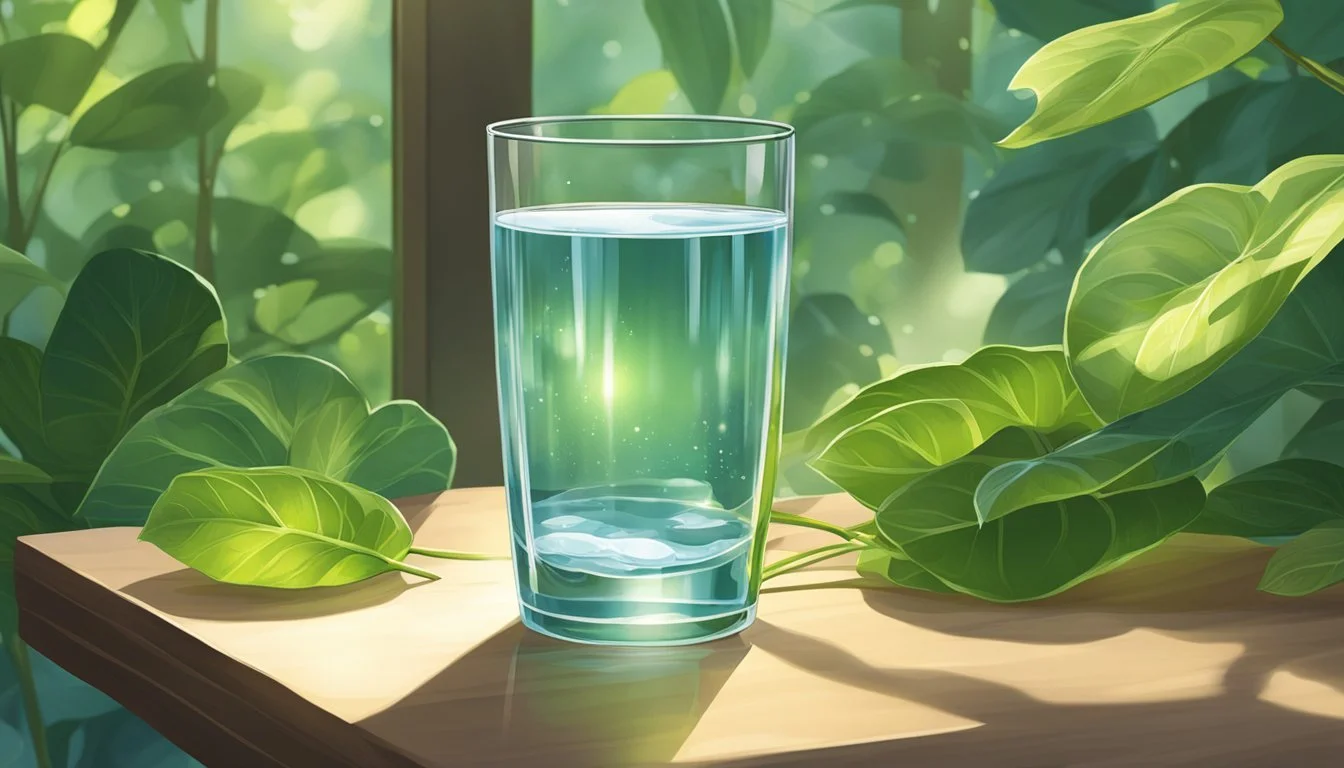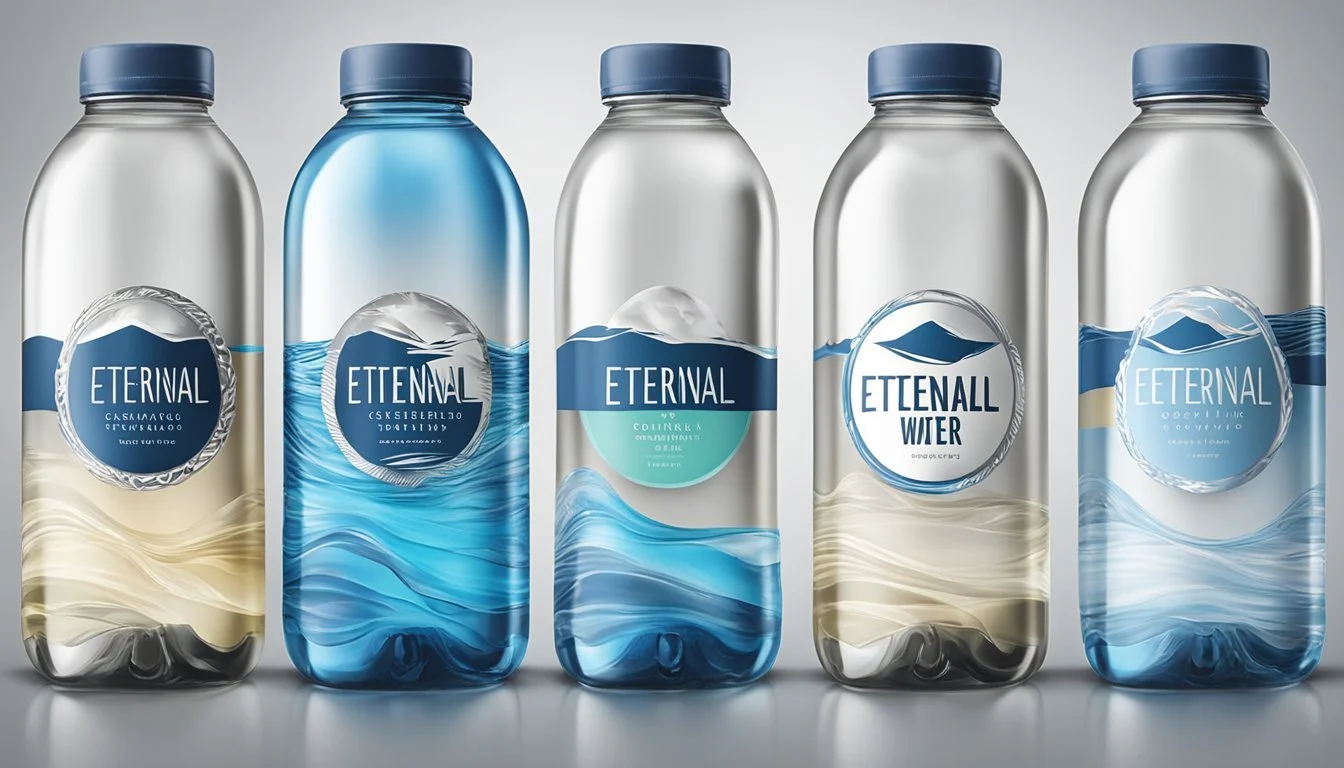Eternal vs. Open Water
A Clear Comparison of Bottled Water Brands
For those seeking a refreshing and sustainable bottled water option, the debate between Eternal and Open Water is compelling. Eternal Water offers naturally alkaline spring water, bottled at the source, aiming to provide a pure and balanced hydration experience. On the other hand, Open Water positions itself as an eco-friendly alternative, utilizing recyclable aluminum bottles that greatly reduce plastic waste.
When it comes to purity and natural benefits, Eternal Water's alkaline properties offer a distinctive edge, appealing to those who prioritize a higher pH for health benefits. Yet, if sustainability is a critical concern, Open Water's packaging choices make it a standout option in reducing environmental impact without compromising on quality.
Understanding the differences in sourcing, packaging, and hydration benefits between these two brands can help consumers make an informed choice. Both options bring unique advantages to the table, catering to diverse preferences and priorities.
Understanding Bottled Water
Bottled water comes in various types, including spring water, purified water, and mineral water. Each type sources its water differently.
Spring water is collected directly from a natural spring, which is groundwater that flows to the surface. On the other hand, purified water undergoes processes such as reverse osmosis, distillation, or deionization to remove impurities.
pH levels can vary, affecting taste and health benefits. For instance, some brands offer water with higher pH levels (alkaline water), which some believe can neutralize acid in the body. Essentia is an example of a brand that offers water with a pH level of 9.5 or higher.
Mineral content also differentiates bottled water. Mineral water contains naturally occurring minerals from the source, which can include calcium, magnesium, and potassium. These minerals can influence both taste and potential health benefits.
Many consumers choose bottled water for convenience and taste consistency. Bottled water can be more reliable during natural disasters or other emergencies when tap water might be contaminated.
Environmental impact is a critical consideration. Although bottled water offers convenience, it also generates plastic waste. Recycling can mitigate some of this impact, but not all plastics are recycled efficiently.
Ultimately, the choice between different types of bottled water often boils down to personal preference and specific needs. It's essential to consider source, purity levels, pH levels, and mineral content when selecting bottled water.
Comparing Eternal and Open Water Brands
Eternal Water and Open Water each bring unique qualities to the table in terms of their brand history, water source, and overall taste. By evaluating these aspects, consumers can make an informed choice between the two.
Brand History and Ethos
Eternal Water is known for its commitment to providing naturally alkaline spring water sourced from protected artesian wells. The company emphasizes sustainable practices and quality.
Open Water focuses on offering an eco-friendly alternative by packaging their water in aluminum bottles. They prioritize reducing plastic waste and promoting recycling.
Both brands highlight environmental consciousness in their operations, but while Eternal Water invests in sourcing high-quality natural spring water, Open Water dedicates efforts toward sustainable packaging.
Source and Composition
Eternal Water is sourced from natural springs in the USA, particularly from underground aquifers that ensure a high mineral content and a naturally alkaline pH. This source provides water with a rich composition of electrolytes, giving it a distinctive quality.
Open Water takes a different path by using purified municipal water treated to remove impurities and contaminants. The water is then packaged in 100% recyclable aluminum containers.
Eternal Water’s natural source gives it a unique composition, whereas Open Water's filtration process focuses on purity and sustainability.
Taste and Refreshment
Eternal Water offers a smooth, refreshing taste attributed to its natural mineral content and alkaline pH. Many users find it to be crisp and pure, enhancing their hydration experience.
Open Water also tastes clean and pure, thanks to rigorous filtration. The eco-friendly packaging does not affect its taste, ensuring that the water remains fresh and enjoyable.
For those prioritizing a distinctive mineral taste, Eternal Water stands out. For consumers more concerned with environmental impact without compromising on taste, Open Water is a solid choice.
Health Benefits of Hydration
Hydration plays a critical role in maintaining overall health by supporting various bodily functions. Key aspects include the importance of electrolytes and minerals, maintaining an optimal pH balance, and the impact of dehydration on physical activity.
Importance of Electrolytes and Minerals
Electrolytes and essential minerals like calcium, potassium, and magnesium are crucial for the body’s hydration process. These components help regulate nerve and muscle function, balance body fluids, and maintain proper blood pressure. Bottled waters such as Eternal Water, known for containing natural minerals, can provide these benefits, enhancing hydration more effectively than plain water. Consuming water with added electrolytes and minerals supports the body in maintaining homeostasis and prevents symptoms like muscle cramps and fatigue.
Optimal pH Balance
Maintaining an optimal pH balance is another significant health benefit of hydration. Alkaline water, often characterized by a higher pH level, helps neutralize acid in the bloodstream, which can improve energy levels and metabolism. Eternal Water, sourced from natural springs, typically has an alkaline pH, which supports systemic functions and may aid in reducing acid reflux and other gastrointestinal issues. The slight alkalinity also enables better absorption of nutrients and expulsion of toxins, thus promoting overall well-being.
Dehydration and Physical Activity
Proper hydration significantly impacts physical activity levels. During exercise, the body loses fluids rapidly, leading to dehydration if not replenished. This can result in decreased endurance, strength, and coordination. Consuming water before, during, and after physical activity helps sustain performance and accelerates recovery. Alkaline waters, with added electrolytes, are preferred by some athletes for their purported benefits in reducing lactic acid buildup and enhancing rehydration speed. Keeping hydrated ensures the body performs optimally by maintaining fluid balance, temperature regulation, and joint lubrication.
Types of Bottled Water
Bottled water varies in source and processing methods, impacting its mineral content, pH levels, and taste. Key categories include alkaline water, spring water, and purified water, each with distinctive properties and benefits.
Alkaline Water
Alkaline water has a higher pH level compared to regular water, often around 8 or 9. This is achieved through ionization or adding alkaline minerals like calcium and magnesium. Some believe that alkaline water aids in balancing the body’s pH and enhances hydration.
Essentia water is a popular brand, utilizing micro-filters, reverse osmosis, and ultraviolet exposure to filter water to 99.9% purity before ionizing it. The result is water with a pH of 9.5 or higher, supplemented with electrolytes.
Spring Water
Spring water originates from natural springs, where water flows to the surface from underground. It typically retains natural minerals, giving it a distinct taste and potential health benefits. The source of spring water is regulated to maintain its purity.
This type of water undergoes minimal processing to preserve its mineral content, ensuring that it remains as close to its natural state as possible. Common minerals found in spring water include calcium, magnesium, and potassium.
Purified Water
Purified water undergoes extensive filtration processes, including distillation, deionization, or reverse osmosis, to remove impurities and contaminants. To meet the definition of "purified water" according to the U.S. Pharmacopeia, it must achieve specific purity standards.
Purified water can start as either tap or spring water before undergoing these processes. The goal is to produce water that is free from almost all types of impurities, making it suitable for those who prefer a clean, neutral tasting water without additional minerals.
Sustainability and Environmental Impact
Eternal Water and Open Water take different approaches to sustainability and environmental impact, focusing on packaging innovations, carbon footprint, and recycling efforts. This section examines these aspects to determine which brand truly aligns with eco-friendly practices.
Packaging and Materials
Eternal Water's bottles are made from recyclable PET plastic, a common material in the beverage industry known for its durability and recyclability. These bottles do not contain BPA, a harmful chemical often found in plastics.
Open Water, on the other hand, uses aluminum cans for its packaging. Aluminum is infinitely recyclable, often used in a "closed-loop" system where a can can become another can without loss of quality.
Boxed Water uses cartons made from 74% paper, blending eco-friendliness with traditional packaging. This mix supports sustainable forest practices but involves the composite materials challenge in recycling.
Ecosystems and Carbon Footprint
The production of PET plastic bottles for Eternal Water generates significant greenhouse gases. Each 50-ounce bottle can release between 1.6 and 22 ounces of CO2 into the atmosphere, contributing to climate change.
Aluminum production is energy-intensive but has a lower lifecycle carbon footprint due to its high recycling efficiency. Despite initial resource consumption, its repeated reuse minimizes long-term environmental damage.
Boxed Water's cartons also show a mixed impact. While paper-based, the production process can still involve substantial energy use and greenhouse gas emissions, but generally less than plastic.
Recycling and Waste Reduction
PET plastic recycling rates are lower compared to aluminum, with many plastic bottles ending up in landfills. Eternal Water's commitment to recyclable materials hinges on consumer action to achieve its intended environmental benefit.
Aluminum cans from Open Water demonstrate superior recyclability. With high market value and wide acceptance in municipal recycling programs, aluminum significantly reduces waste.
Boxed Water cartons present a different challenge. Mixed materials complicate the recycling process. Efforts to improve paper carton recycling technology are ongoing to enhance waste reduction.
In conclusion, while PET plastic and aluminum each have different strengths and weaknesses in sustainability, aluminum's better recycling potential makes it a strong contender. Open Water's use of aluminum is a notable step forward in sustainable packaging.
Regulations and Quality Control
Bottled water quality is maintained through a series of stringent regulations and consistent testing methods aimed at ensuring safety and cleanliness for consumers.
FDA Standards
The FDA oversees the regulation of bottled water in the United States. They enforce Current Good Manufacturing Practices (CGMP) specifically for bottled water production.
Bottlers must adhere to these CGMP regulations to ensure safe processing and bottling.
These standards mandate regular inspection of facilities and equipment to maintain strict hygiene.
Moreover, FDA standards stipulate detailed labeling requirements, ensuring consumers are informed about the source and quality of the water they purchase.
Labeling must include:
Source of water
Mineral content
Treatment processes
Compliance with these standards guarantees that bottled water is free from harmful contaminants.
Testing for Contaminants
Ensuring the purity of bottled water involves rigorous testing for contaminants. Bottled water must be sampled and tested more frequently compared to public drinking water, regulated by the EPA.
Tests target a range of contaminants, including bacteria, chemicals, and minerals. Any detected impurities must be within the FDA's allowable limits for safe consumption.
Bottlers often use advanced filtration techniques, such as:
Reverse osmosis
Ultraviolet light treatment
These methods help remove contaminants and ensure the water meets purity standards. Periodic testing ensures ongoing compliance with health and safety regulations.
Results from these tests must be documented meticulously and made available for regulatory review. This meticulous process safeguards consumers by maintaining high standards in bottled water quality.
Convenience and Consumer Choices
Different factors influence consumer decisions when choosing between Eternal and Open Water, such as availability, cost, and potential risks. Both brands present unique selling points but also come with specific considerations.
Availability and Accessibility
Eternal Water is often found in many supermarkets, convenience stores, and online platforms. Its widespread distribution makes it a convenient choice for many consumers.
Open Water offers an eco-friendly option with aluminum packaging, and while it may not be as widely available as Eternal, it is increasingly present in health-conscious and sustainable-living stores. Both brands are convenient for different consumer segments, depending on availability in local areas and shopping preferences.
Cost Comparison
Eternal Water typically has a higher price point due to its naturally alkaline properties and specialized bottling process. This may make it less accessible to budget-conscious consumers.
Open Water, with its mission to reduce plastic waste, also commands a premium price. However, its cost can sometimes be more competitive compared to other eco-friendly brands. Price-sensitive buyers might consider bulk purchasing or subscription services to mitigate costs for both brands.
Risks and Considerations
Both Eternal and Open Water aim for high water quality, but each has unique considerations. Eternal Water, bottled at the source, ensures consistent quality but comes in PET plastic, which may concern environmentally conscious consumers despite being recyclable.
Open Water's aluminum packaging addresses environmental concerns, but aluminum can dent easily and is less familiar to consumers used to plastic or glass. Consumers must balance their health, environmental impact, and personal preferences when choosing between these two bottled water options.
Conclusion and Recommendations
Hydration: Both Eternal and Open Water offer effective solutions for staying hydrated. Eternal Water boasts natural alkaline properties, while Open Water is purified and packaged in eco-friendly aluminum bottles.
Quality: Eternal Water is praised for its refreshing taste and consistent alkalinity, with a pH of 8.0-9.5. Open Water, on the other hand, undergoes rigorous purification to ensure high quality and a clean, crisp taste.
Bottled Water: When choosing between the two, consider the packaging. Eternal Water uses plastic bottles, whereas Open Water promotes sustainability with its 100% recyclable aluminum bottles.
Sustainability: Open Water stands out for its commitment to reducing plastic waste. Eternal Water also practices sustainability but in different ways, such as eco-friendly packaging initiatives.
Daily Routine: For those who carry bottled water daily, Open Water's aluminum bottles provide a durable and reusable option. Eternal Water, with its portable plastic bottles, also fits well into a busy lifestyle but might not align with those aiming to minimize plastic usage.
Recommendation: If sustainability and minimizing plastic waste are top priorities, Open Water is the better choice. For those seeking naturally alkaline water with a focus on consistent taste, Eternal Water is a suitable option.
More About Eternal
Eternal vs Icelandic Glacial: Which Bottled Water is Better?
Eternal vs Kirkland Signature: Which Bottled Water is Better?
Eternal vs Mountain Valley Spring Water: Which Bottled Water is Better?
Eternal vs Richard's Rainwater: Which Bottled Water is Better?
Eternal vs Whole Foods Italian Still Mineral water: Which Bottled Water is Better?
More About Open Water
Aqua Carpatica vs Open Water: Which Bottled Water is Better?
Cascade Mountain vs Open Water: Which Bottled Water is Better?
Core Hydration vs Open Water: Which Bottled Water is Better?
Crystal Geyser vs Open Water: Which Bottled Water is Better?
Hawaii Volcanic vs Open Water: Which Bottled Water is Better?
Hawaiian Springs vs Open Water: Which Bottled Water is Better?
Icelandic Glacial vs Open Water: Which Bottled Water is Better?
Mountain Valley Spring Water vs Open Water: Which Bottled Water is Better?
Nestle Pure Life vs Open Water: Which Bottled Water is Better?
Open Water vs Kirkland Signature: Which Bottled Water is Better?
Open Water vs Whole Foods 365: Which Bottled Water is Better?
Richard's Rainwater vs Open Water: Which Bottled Water is Better?
San Pellegrino vs Open Water: Which Bottled Water is Better?
Solan de Cabras vs Open Water: Which Bottled Water is Better?
Talking Rain AQA vs Open Water: Which Bottled Water is Better?
Whole Foods Italian Still Mineral water vs Open Water: Which Bottled Water is Better?








